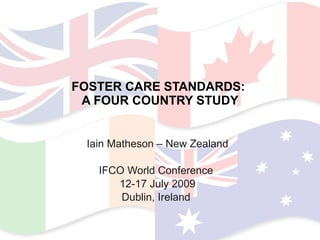
Foster Care Standards in Australia, Canada, Ireland and the UK: Plenary presentation to the International Foster Care Organisation world conference, Dublin, 2009
- 1. FOSTER CARE STANDARDS: A FOUR COUNTRY STUDY Iain Matheson – New Zealand IFCO World Conference 12-17 July 2009 Dublin, Ireland
- 6. FINDING ONE 1: Almost all jurisdictions in the study had published foster care standards - some had more than one set.
- 12. FINDING TWO 2: In most jurisdictions, the publishing of sets of foster care standards is a very recent development
- 14. FINDING THREE 3: Alongside many similarities, there were considerable differences across the sets of standards. 32 characteristics across 6 dimensions are identified.
- 15. 1: FRAMING Quality Improvement Formalise expectations 1.2: PURPOSE Sector Government 1.1: DEVELOPED BY Incremental Specific events 1.3: IMPETUS Aspirational Minimum 1.4: NATURE Compulsory Voluntary 1.5: STATUS Detailed Principles/high level only 1.6: DESIGN
- 16. 2: SCOPE Child Welfare Foster Care 2.1: ADDRESSES Foster Care System Foster Carers 2.2: FOCUS Comprehensive One specialist area 2.3: COVERAGE Part of package of measures or support Stand-alone 2.4: INITIATIVE
- 17. 3: DEVELOPMENT PROCESS Develop afresh Adapt 3.3: APPROACH Yes Not explicitly 3.4: RESEARCH-BASED? A range of agencies A single agency 3.1: STATED AUTHOR Large Small 3.6: SCALE OF EXERCISE Large-scale None or limited 3.5: CONSULTATION Range of subgroups A delegated individual 3.2: DRAFTED BY
- 18. 4: DESCRIPTION Stand-alone standards document Foster care manual/ service specs (BAU) 4.1: PRESENTATION High level None 4.3: ENDORSEMENT Yes No 4.4: STATUS CLEAR? Criteria-based Narrative-based 4.2: CONSTRUCTION OF INDIVIDUAL STANDARDS Legislation, policy & research None / Limited 4.5: LINKAGES CLEAR? Long Short 4.6: LENGTH
- 19. 5: IMPLEMENTATION Costed & Funded None 5.1: RESOURCING Whole of sector Part of Sector 5.2: DISSEMINATION Whole of sector None 5.3: TRAINING Yes No 5.4: PILOTING Yes No 5.5: PHASING
- 20. 6: MONITORING & EVALUATION Yes No 6.1: INTERVENTION LOGIC EXPLICIT? Yes No 6.3: FORMATIVE EVALUATION Yes No 6.5: SUMMATIVE EVALUATION Regular / Ongoing None / Limited 6.4: REVISIONS Systematic None or ad hoc 6.2: FORMAL MONITORING
- 21. FINDING FOUR 4: While the development of foster care standards can be seen as part of the globalisation of foster care, from the study context appears to still be critically important.
- 24. FINDING FIVE 5: From the research six types of national/state/ provisional/territorial foster care standards were identified: 1: Best Practice 2: Expected Practice 3: Minimum Practice 4: Practice Principles 5: Ambiguous 6: Mixed
- 25. TYPOLOGY OF STANDARDS Type 1 Best Practice Comprehensively describe and promote excellent or best practice. Developed collaboratively by the sector, these are major undertakings that draw heavily upon both research and professional knowledge. Type 2 Expected Practice Articulation by Government of fostering standards expected by foster carers and fostering agency staff. Responsibility for monitoring largely at a casework and contract management level. Type 3 Minimum Practice Articulation by Government of standards that must be met. Usually apply to the agencies rather than individual foster carers that are subject to independent inspection with associated recommendations and statutory requirements. Type 4 Practice Principles Broad statements of principle. May also be expressed in primary legislation and/or regulations. Type 5 Ambiguous Apparent disconnect between policy intent and reality and/or policy framework not clear from interviews (where undertaken) and standards documents. Type 6 Mixed Standards strongly reflect elements from two or more of above types.
- 26. FINDING SIX 6: The development of foster care standards were largely seen by interviewees as an important and positive development.
- 28. FINDING SEVEN The introduction of standards has (as yet) had a limited impact on improving outcomes for children and young people and for some interviewees there has not been an attributable improvement in the quality of foster care .
